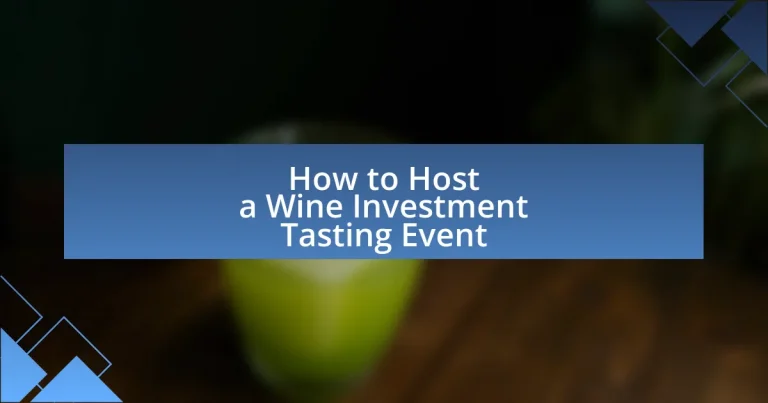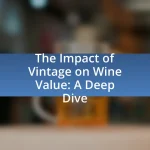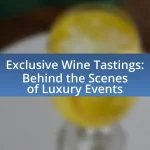A Wine Investment Tasting Event is a specialized gathering where participants evaluate various wines for their investment potential, focusing on factors such as quality, rarity, and market trends. This article outlines the essential components for hosting a successful event, including venue selection, wine curation, expert presentations, and effective marketing strategies. It also discusses the differences between investment tastings and regular tastings, the target audience, and best practices to ensure a smooth and engaging experience for attendees. Additionally, the article highlights the importance of food pairings and interactive discussions to enhance the overall event experience.
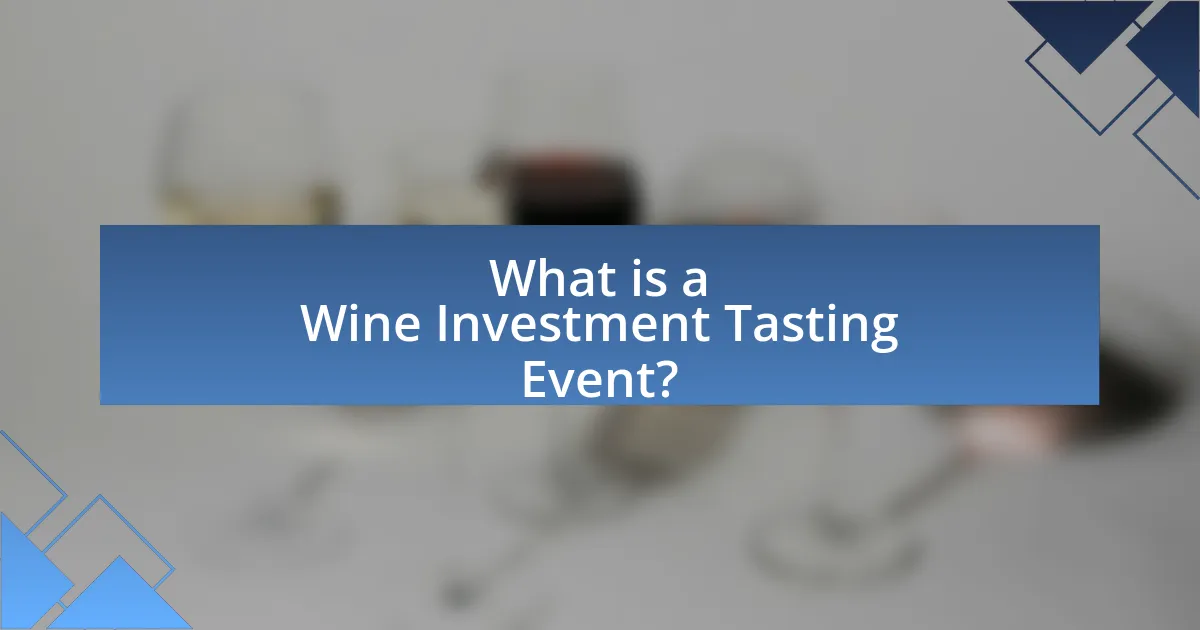
What is a Wine Investment Tasting Event?
A Wine Investment Tasting Event is a gathering where participants sample various wines with the intent of evaluating their investment potential. These events typically feature a selection of fine wines, often from renowned vineyards, allowing attendees to assess factors such as quality, rarity, and market trends. The objective is to educate participants on the nuances of wine investment, including how to identify valuable bottles and understand market dynamics. Such events often include expert speakers or sommeliers who provide insights into the wine market, enhancing the overall experience and knowledge of the attendees.
How does a Wine Investment Tasting Event differ from a regular wine tasting?
A Wine Investment Tasting Event differs from a regular wine tasting primarily in its focus on the financial potential of the wines being sampled. While a regular wine tasting emphasizes sensory experiences and enjoyment of flavors, an investment tasting centers on evaluating wines as assets, considering factors such as rarity, vintage quality, and market trends. This distinction is crucial, as investment tastings often include expert insights on the wine market, investment strategies, and potential returns, which are not typically part of standard tastings.
What are the key objectives of hosting a Wine Investment Tasting Event?
The key objectives of hosting a Wine Investment Tasting Event are to educate participants about wine investment opportunities, facilitate networking among investors and wine producers, and showcase premium wines that have potential for appreciation. Educating participants helps them understand market trends, valuation, and the factors influencing wine investment returns. Networking allows investors to connect with industry experts and fellow enthusiasts, fostering relationships that can lead to future investment opportunities. Showcasing premium wines provides tangible examples of investment-grade wines, enhancing participants’ appreciation and understanding of the market.
Why is wine considered a viable investment option?
Wine is considered a viable investment option due to its historical appreciation in value and the increasing demand among collectors and investors. Over the past two decades, fine wine has shown an average annual return of around 10% according to the Liv-ex Fine Wine 100 index, which tracks the price movements of the most sought-after wines. Additionally, the limited supply of certain vintages, combined with the growing interest in wine as an alternative asset class, further enhances its investment potential.
What are the essential components of a successful Wine Investment Tasting Event?
The essential components of a successful Wine Investment Tasting Event include a curated selection of high-quality wines, knowledgeable presenters, an engaging venue, and effective marketing strategies. A curated selection ensures that participants experience wines with investment potential, such as those from renowned regions or producers. Knowledgeable presenters, such as sommeliers or wine investment experts, provide valuable insights into the wines’ characteristics and market trends, enhancing the educational aspect of the event. An engaging venue, ideally with a sophisticated ambiance, encourages networking and creates a memorable experience for attendees. Effective marketing strategies, including targeted invitations and promotional materials, attract the right audience, ensuring that the event meets its investment objectives. These components collectively contribute to the overall success and impact of the tasting event.
What types of wines should be featured at the event?
The types of wines that should be featured at the event include high-quality red wines, white wines, and sparkling wines. High-quality red wines, such as Bordeaux or Napa Valley Cabernet Sauvignon, are often sought after for their investment potential and aging capability. White wines like Burgundy or high-end Sauvignon Blanc can also attract interest due to their rarity and quality. Additionally, featuring premium sparkling wines, such as Champagne, can appeal to attendees looking for luxury options. These selections are supported by market trends indicating that fine wines from renowned regions tend to appreciate in value, making them attractive for investment purposes.
How do you select the right venue for the event?
To select the right venue for a wine investment tasting event, assess the venue’s capacity, ambiance, and accessibility. The venue must comfortably accommodate the expected number of guests while providing an atmosphere conducive to wine tasting, which typically includes a quiet, elegant setting. Additionally, the venue should be easily accessible for attendees, ideally located near transportation options. Research indicates that venues with a strong reputation for hosting similar events can enhance the overall experience, as they often provide necessary amenities such as proper lighting, temperature control, and wine storage facilities.
What are the target audiences for a Wine Investment Tasting Event?
The target audiences for a Wine Investment Tasting Event include affluent individuals, wine collectors, investors interested in alternative assets, and wine industry professionals. Affluent individuals often seek unique investment opportunities, while wine collectors are typically passionate about expanding their collections and knowledge. Investors interested in alternative assets recognize the potential for wine to appreciate in value, and wine industry professionals may attend to network and gain insights into market trends. These groups are motivated by the combination of financial gain and a passion for wine, making them ideal participants for such events.
Who are the potential investors interested in wine?
Potential investors interested in wine include high-net-worth individuals, wine collectors, and investment firms specializing in alternative assets. High-net-worth individuals often seek wine as a tangible asset that can appreciate over time, while wine collectors view it as both a passion and an investment opportunity. Investment firms may focus on wine as part of a diversified portfolio, recognizing its potential for returns, especially in regions known for premium wine production, such as Bordeaux and Napa Valley. According to a report by Liv-ex, the fine wine market has seen significant growth, with the Liv-ex Fine Wine 100 index rising by 20% over the past five years, indicating strong investor interest and potential profitability in wine investments.
How can you attract wine enthusiasts to the event?
To attract wine enthusiasts to the event, offer exclusive tastings of rare and high-quality wines. This strategy appeals to their interest in unique wine experiences and enhances the perceived value of attending. Research indicates that wine enthusiasts are particularly drawn to events featuring limited releases or wines from renowned vineyards, as these opportunities allow them to expand their knowledge and collection. Additionally, promoting expert-led discussions or workshops on wine investment can further engage this audience, as they seek to deepen their understanding of wine as an asset.
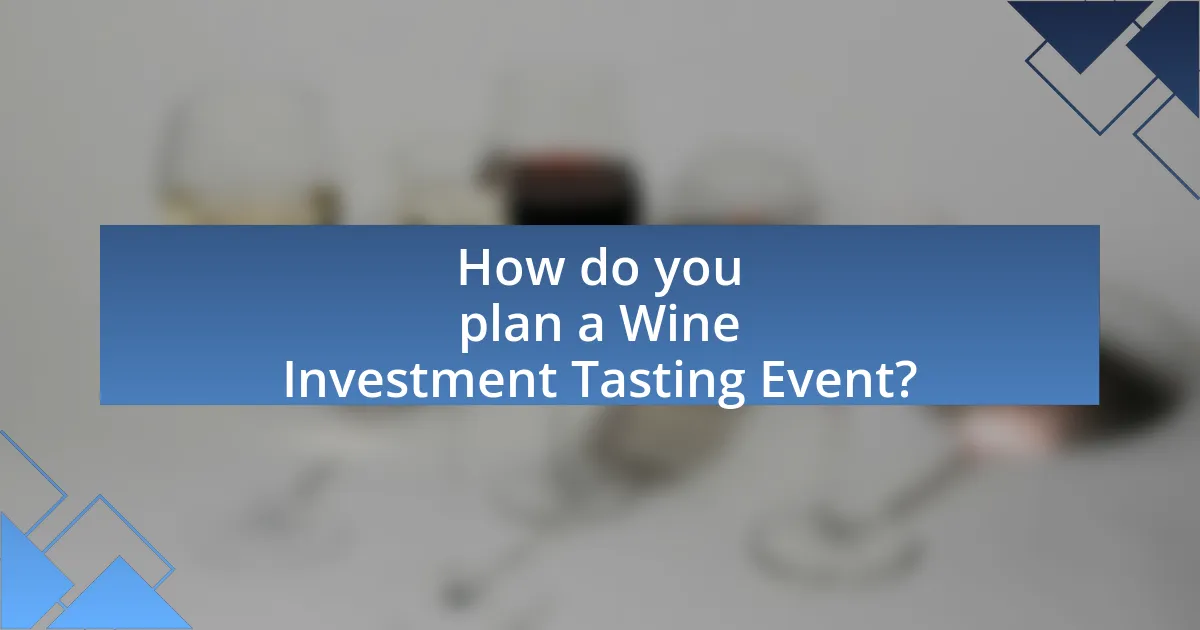
How do you plan a Wine Investment Tasting Event?
To plan a Wine Investment Tasting Event, first establish a clear objective, such as educating attendees about wine investment opportunities. Next, select a suitable venue that accommodates the expected number of guests and provides an appropriate atmosphere for wine tasting. Curate a selection of wines that represent various investment potentials, including both established and emerging labels.
Additionally, invite knowledgeable speakers or sommeliers to provide insights on wine investment trends and valuation. Promote the event through targeted marketing to attract potential investors and wine enthusiasts. Finally, ensure that all logistical details, such as catering, glassware, and tasting notes, are organized in advance to facilitate a smooth experience for attendees.
What steps are involved in organizing the event?
The steps involved in organizing a wine investment tasting event include defining the event’s purpose, selecting a suitable venue, creating a budget, choosing the wines to be featured, promoting the event, and coordinating logistics. Defining the event’s purpose helps establish the target audience and desired outcomes, while selecting a venue ensures an appropriate atmosphere and capacity for attendees. Creating a budget outlines expected costs and revenue, which is crucial for financial planning. Choosing the wines involves selecting a diverse range that appeals to investors, enhancing the tasting experience. Promoting the event through various channels increases attendance, and coordinating logistics, such as catering and equipment, ensures a smooth execution. Each of these steps is essential for a successful wine investment tasting event.
How do you create an effective event timeline?
To create an effective event timeline, start by outlining all key activities and milestones related to the event. This includes determining the event date, venue, and necessary permits, followed by scheduling tasks such as vendor bookings, marketing efforts, and guest invitations. Each task should have a specific deadline and assigned responsibilities to ensure accountability.
For instance, if the event is a wine investment tasting, the timeline should include deadlines for securing wine suppliers, arranging tasting logistics, and finalizing the guest list at least a month in advance. Research indicates that detailed timelines improve event execution efficiency by up to 30%, as they help organizers stay on track and manage time effectively.
What budget considerations should be taken into account?
When hosting a wine investment tasting event, key budget considerations include venue costs, wine selection, catering, marketing, and staffing. Venue costs can vary significantly based on location and capacity, impacting the overall budget. Wine selection is crucial, as high-quality wines can be expensive, and the quantity needed will depend on the number of attendees. Catering expenses should account for food pairings that complement the wines, which can also influence guest experience and satisfaction. Marketing efforts, including promotional materials and advertising, are essential for attracting attendees and should be factored into the budget. Lastly, staffing costs for servers and event coordinators must be considered to ensure smooth event execution. Each of these elements directly affects the financial planning and overall success of the event.
How can you promote the Wine Investment Tasting Event?
To promote the Wine Investment Tasting Event, utilize targeted digital marketing strategies such as social media advertising, email campaigns, and partnerships with wine influencers. Social media platforms like Instagram and Facebook allow for precise audience targeting, enabling the event to reach wine enthusiasts and potential investors effectively. Email campaigns can be tailored to existing customer databases, highlighting the unique investment opportunities presented at the event. Collaborating with wine influencers can amplify reach, as their endorsements can attract a wider audience interested in wine investment. According to a study by HubSpot, businesses that prioritize blogging are 13 times more likely to achieve a positive ROI, indicating that content marketing can also play a crucial role in promoting the event.
What marketing strategies are most effective for this type of event?
Effective marketing strategies for a wine investment tasting event include targeted social media advertising, partnerships with wine influencers, and email marketing campaigns. Targeted social media advertising allows event organizers to reach specific demographics interested in wine investment, increasing attendance. Collaborating with wine influencers can enhance credibility and attract a larger audience, as their followers often trust their recommendations. Email marketing campaigns can effectively engage potential attendees by providing exclusive content, early bird ticket offers, and reminders about the event, which can lead to higher conversion rates. These strategies are supported by data indicating that events promoted through social media and influencer partnerships see a significant increase in attendance, with studies showing that targeted ads can improve event visibility by up to 70%.
How can social media be utilized to reach potential attendees?
Social media can be utilized to reach potential attendees by creating targeted advertising campaigns that focus on specific demographics interested in wine investment. Platforms like Facebook and Instagram allow event organizers to define their audience based on interests, behaviors, and location, ensuring that promotional content reaches individuals likely to attend. For instance, a study by the Pew Research Center indicates that 69% of adults in the U.S. use social media, making it a powerful tool for engagement. Additionally, sharing engaging content such as videos, testimonials, and behind-the-scenes looks at the event can increase interest and encourage sharing among users, further expanding reach.
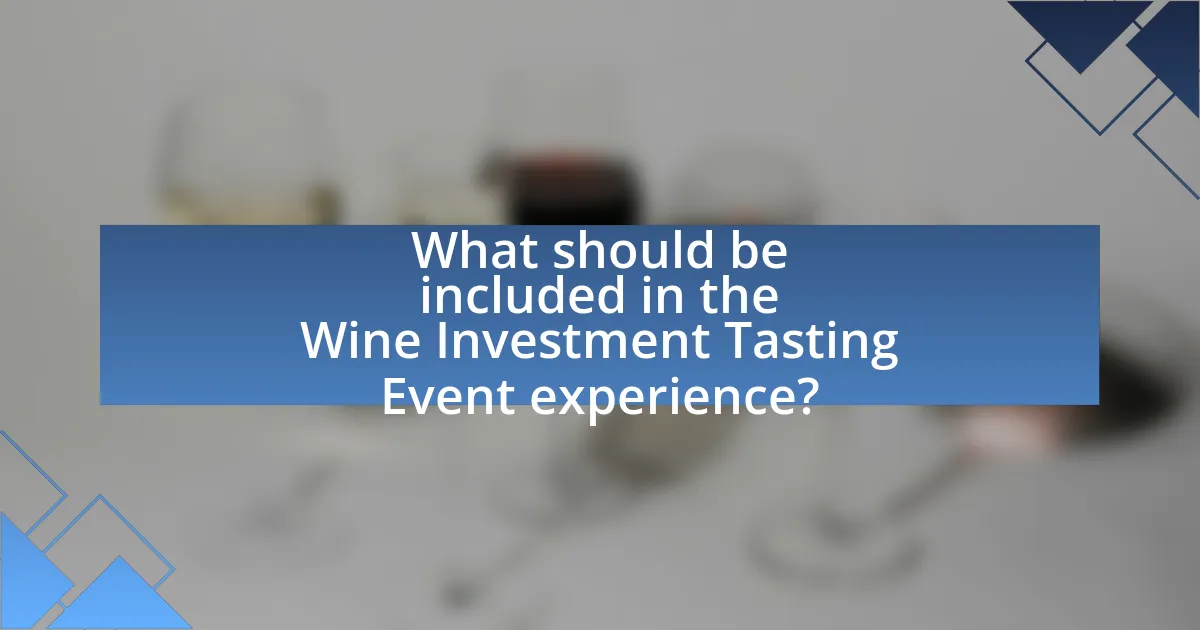
What should be included in the Wine Investment Tasting Event experience?
A Wine Investment Tasting Event experience should include a curated selection of high-quality wines, expert-led tastings, and educational components on wine investment strategies. The curated selection ensures participants sample wines with investment potential, while expert-led tastings provide insights into the characteristics and market value of each wine. Educational components, such as presentations or discussions on market trends and valuation methods, enhance participants’ understanding of wine as an investment asset. This structured approach not only enriches the tasting experience but also equips attendees with the knowledge necessary to make informed investment decisions in the wine market.
How do you structure the tasting portion of the event?
To structure the tasting portion of the event, begin by selecting a diverse range of wines that represent different regions, varietals, and price points. This selection allows participants to experience a broad spectrum of flavors and styles, enhancing their understanding of wine investment potential. Each wine should be presented with detailed information, including its origin, tasting notes, and investment value, to educate attendees on the characteristics that influence market demand.
Additionally, organize the tasting in a logical sequence, typically starting with lighter wines and progressing to fuller-bodied options, which helps to cleanse the palate and maintain engagement. Provide tasting sheets for participants to take notes, facilitating a more interactive experience. This structured approach not only enriches the tasting experience but also aligns with best practices in wine education, as evidenced by industry standards that emphasize the importance of context and information in wine tastings.
What information should be provided about each wine?
Each wine should include the following information: name, vintage, region of origin, grape variety, alcohol content, tasting notes, and food pairing suggestions. This information helps attendees understand the characteristics and quality of the wine, enhancing their tasting experience. For instance, the vintage indicates the year the grapes were harvested, which can affect flavor profiles, while the region of origin often reflects the terroir, influencing the wine’s taste. Tasting notes provide insights into the wine’s aroma and flavor, and food pairing suggestions enhance the overall enjoyment by recommending complementary dishes.
How can you facilitate discussions about wine investment opportunities?
To facilitate discussions about wine investment opportunities, create an engaging environment that encourages open dialogue among participants. This can be achieved by providing informative materials, such as market analysis reports and investment guides, which outline the potential returns and risks associated with wine investments. Additionally, inviting industry experts to share insights and experiences can enhance the conversation, as their expertise lends credibility and depth to the discussion. Research indicates that structured discussions, supported by data on historical wine price trends and investment performance, can significantly improve participants’ understanding and interest in wine as an investment asset.
What additional activities can enhance the event experience?
Interactive wine pairing sessions can enhance the event experience by engaging attendees in a hands-on learning process. These sessions allow participants to explore the nuances of wine flavors and food pairings, fostering a deeper appreciation for the wines being tasted. Research indicates that interactive experiences increase retention and enjoyment, as participants are more likely to remember and value the information presented when they actively engage with it. Additionally, incorporating expert-led discussions or Q&A sessions can provide attendees with insights into wine investment strategies, further enriching their experience and knowledge.
How can guest speakers or experts add value to the event?
Guest speakers or experts add value to the event by providing specialized knowledge and insights that enhance the overall experience for attendees. Their expertise can offer attendees a deeper understanding of wine investment trends, market analysis, and tasting techniques, which are crucial for making informed decisions. For instance, a wine investment expert can share data on historical price trends and future forecasts, helping participants grasp the financial aspects of wine as an investment. Additionally, guest speakers can engage the audience through interactive discussions, Q&A sessions, and personal anecdotes, fostering a more dynamic and informative environment. This combination of knowledge and engagement not only enriches the event but also builds credibility and trust among participants, ultimately leading to a more successful and impactful experience.
What role does food pairing play in a Wine Investment Tasting Event?
Food pairing enhances the overall experience of a Wine Investment Tasting Event by complementing the flavors of the wines being showcased. This strategic combination allows participants to better appreciate the nuances of each wine, as certain foods can elevate specific tasting notes and aromas. For instance, pairing a full-bodied red wine with rich meats can highlight the wine’s tannins and fruit characteristics, making the tasting more memorable and informative. Additionally, studies have shown that food can influence the perception of wine flavors, with research indicating that certain pairings can enhance the enjoyment and understanding of the wine’s profile. Therefore, incorporating thoughtful food pairings is essential for maximizing the educational and sensory value of the event.
What are the best practices for hosting a successful Wine Investment Tasting Event?
To host a successful Wine Investment Tasting Event, it is essential to carefully select high-quality wines that have strong investment potential, such as those from renowned vineyards or vintages with historical appreciation. Additionally, creating an inviting atmosphere with appropriate seating, lighting, and decor enhances the experience for attendees. Providing expert guidance, such as a knowledgeable sommelier or wine investment specialist, can help participants understand the nuances of wine investment and make informed decisions.
Furthermore, offering educational materials, such as tasting notes and investment guides, allows guests to engage more deeply with the wines presented. It is also beneficial to limit the number of wines tasted to ensure that each wine receives adequate attention and discussion. Finally, incorporating networking opportunities can facilitate connections among attendees, fostering a community of wine investors. These practices collectively contribute to a well-rounded and informative event that encourages participation and investment in wine.
How can you ensure a smooth flow of the event?
To ensure a smooth flow of the event, establish a detailed schedule and communicate it clearly to all participants. A well-structured timeline allows for timely transitions between activities, such as tastings, presentations, and networking opportunities. Additionally, having a designated event coordinator to manage logistics and address any issues that arise can significantly enhance the event’s efficiency. Research indicates that events with clear agendas and active management experience higher participant satisfaction and engagement, as noted in the Event Marketing Institute’s 2020 report, which highlights the importance of organization in event success.
What common pitfalls should be avoided during the event?
Common pitfalls to avoid during a wine investment tasting event include inadequate preparation, poor venue selection, and lack of clear communication. Inadequate preparation can lead to disorganized presentations and insufficient wine selections, which detracts from the overall experience. Poor venue selection can result in uncomfortable settings that do not accommodate the expected number of guests, impacting engagement and enjoyment. Lack of clear communication regarding the event’s purpose and agenda can confuse attendees, diminishing their understanding of the investment opportunities presented. These pitfalls can significantly undermine the event’s success and should be carefully managed to ensure a positive experience for all participants.
